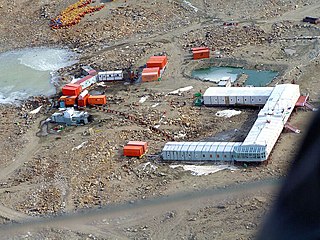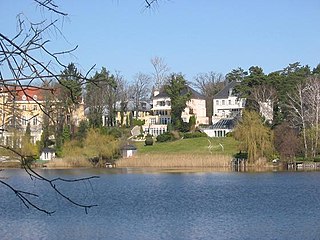
The Antarctic is a polar region around Earth's South Pole, opposite the Arctic region around the North Pole.

Karl Weyprecht, also spelt Carl Weyprecht, was an Austro-Hungarian explorer. He was an officer in the Austro-Hungarian Navy. He is most famous as an Arctic explorer, and an advocate of international cooperation for scientific polar exploration. Although he did not live to see it occur, he is associated with the organisation of the first International Polar Year.

The International Union for Conservation of Nature (IUCN) is an international organization working in the field of nature conservation and sustainable use of natural resources. It is involved in data gathering and analysis, research, field projects, advocacy, and education. IUCN's mission is to "influence, encourage and assist societies throughout the world to conserve nature and to ensure that any use of natural resources is equitable and ecologically sustainable".

Hanover Zoo is located in the city centre, or Mitte borough, of Hanover, Germany. The zoo was established on 4 May 1865, and comprises an area of 22 hectares. It contains about 3,414 animals in 237 species, which are cared for by more than 400 employees in the summer season.

Maitri also known as Friendship Research Centre, is India's second permanent research station in Antarctica as part of the Indian Antarctic Programme. The name was suggested by then-Prime Minister Indira Gandhi. Work on the station was first started by the Indian Expedition which landed there in the end December 1984, with a team led by Dr. B. B. Bhattacharya. Squadron Leader D. P. Joshi, the surgeon of the team, was the first camp commander of the tentage at camp Maitri. The first huts were started by the IV Antarctica Expedition and completed in 1989, shortly before the first station Dakshin Gangotri was buried in ice and abandoned in 1990–91. Maitri is situated in the rocky mountainous region called Schirmacher Oasis. It is only 5 kilometres (3.1 mi) away from the Russian Novolazarevskaya Station.

Grunewald is a locality (Ortsteil) within the Berlin borough (Bezirk) of Charlottenburg-Wilmersdorf. Famous for the homonymous forest, until 2001 administrative reform it was part of the former district of Wilmersdorf.

Mawson's Huts are the collection of buildings located at Cape Denison, Commonwealth Bay, in the far eastern sector of the Australian Antarctic Territory, some 3000 km south of Hobart. The buildings were erected and occupied by the Australasian Antarctic Expedition (AAE) of 1911-1914, led by geologist and explorer Sir Douglas Mawson.

The Law-Racoviță-Negoiță Station, known only as the Law-Racoviță Station until 2011, is the first Romanian station for research and exploration in Antarctica, named after the Romanian explorer Emil Racoviță and inaugurated on January 13, 2006 at the location of a station constructed in 1986 by Australia and donated to Romania. The station may be found in Princess Elizabeth Land, in the Larsemann Hills, 2 kilometres (1.2 mi) away from China's Antarctic Zhongshan Station.

The British Exploring Society is a UK-based youth development charity based at the Royal Geographical Society building, aiming to provide young people with an intense and lasting experience of self-discovery in wilderness environments.

Patriot Hills Base Camp was a private seasonally occupied camp in Antarctica. It was located in the Heritage Range of the Ellsworth Mountains, next to the Patriot Hills that gave it its name.
The Pakistan Antarctic Programme, abbreviated as PAP) is a scientific administrative division of the Ministry of Science and Technology (MoST) which represents the Government of Pakistan on the continent of Antarctica. The program coordinates scientific research and operational support in the region. The program is funded by the Pakistan Science Foundation and the Ministry of Science and Technology.
The Jinnah Antarctic Station is an Antarctic research station operated by the Pakistan Antarctic Programme. Located in East Antarctica, it lies in the vicinity of the Sør Rondane Mountains in Queen Maud Land, and is named after Muhammad Ali Jinnah.

Queen Maud Land is a roughly 2.7-million-square-kilometre (1.0-million-square-mile) region of Antarctica claimed by Norway as a dependent territory. It borders the claimed British Antarctic Territory 20° west and the Australian Antarctic Territory 45° east. In addition, a small unclaimed area from 1939 was annexed in June 2015. Positioned in East Antarctica, it makes out about one-fifth of the continent, and is named after the Norwegian queen Maud of Wales (1869–1938).

The Union Glacier Camp is the only private seasonally occupied camp site located in Ellsworth Land in Antarctica. The camp is located in the Heritage Range, below the Ellsworth Mountains, on Union Glacier, that gives the camp its name.

Felicity Ann Dawn Aston is a British explorer, author and former climate scientist.
Students on Ice Foundation is a Canadian charitable organisation that leads educational expeditions to the Arctic and Antarctic for international high school and university students. Its mandate is to provide youth, educators and scientists from around the world with learning and teaching opportunities in the polar regions, with the goal of fostering an understanding of, and commitment to building a more sustainable future.
Parker Liautaud is a climate researcher who has undertaken several polar expeditions. He graduated from Yale University in New Haven, Connecticut.

International competition extended to the continent of Antarctica during the World War II era, though the region saw no combat. During the prelude to war, Nazi Germany organised the 1938 Third German Antarctic Expedition to preempt Norway's claim to Queen Maud Land. The expedition served as the basis for a new German claim, called New Swabia. A year later, the United States Antarctic Service Expedition established two bases, which operated for two years before being abandoned. Responding to these encroachments, and taking advantage of Europe's wartime turmoil, the nearby nations of Chile and Argentina made their own claims. In 1940 Chile proclaimed the Chilean Antarctic Territory in areas already claimed by Britain, while Argentina proclaimed Argentine Antarctica in 1943 in an overlapping area.














